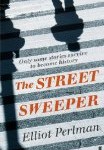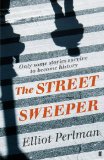Five words from the blurb: history, Holocaust, relationship, civil-rights, New York
The Street Sweeper is my favourite book of the year so far. It contains everything I love to see in a book: fantastic characters, new information, thought-provoking questions, lots of emotion, and a satisfying plot.
The book begins with Lamont Williams leaving prison after serving a sentence for a crime he didn’t commit. He finds work as a hospital cleaner in New York and befriends an old man on the cancer ward. Lamont discovers this man is a Holocaust survivor and through numerous conversations he learns about what he went through all those years ago.
Inter-weaved with this story is that of Adam Zignelli, a history professor, who is looking for a new field of research. He decides to find out whether or not black Americans soldiers were present during the liberation of Dachau. This leads to some interesting comparisons between the black Americans seeking racial equality and the Jews persecuted in Europe.
The Street Sweeper covers many different subjects, but the overriding theme is that of history and how easily it can be forgotten.
‘History can provide comfort in difficult or even turbulent and traumatic times. It shows us what our species has been through before and that we survived it. It can help to know we’ve made it through more than one dark age. And history is vitally important because perhaps as much as, if not more than biology, the past owns us and however much we think we can, we cannot escape it. If you only knew how close you are to people who seem so far from you…it would astonish you.’
It also makes important points about how we remember the biggest events, but smaller ones are no less important, especially to those personally involved.
This book isn’t perfect. I occasionally felt that these messages lacked subtlety and key points were repeated too often, but I’m willing to forgive these as the rest of the book was so impressive.
I should warn readers that some of the Holocaust scenes were very disturbing, but I think it is important to fully understand what happened. Despite having read a number of books on the Holocaust, The Street Sweeper, looks at things from a slightly different angle (that of the Sonderkommando) and I found that most of the information was new to me.
At 550 pages long this book isn’t a quick read, but I never became bored – I was captivated from beginning to end. I was concerned about how all the different threads of the story would tie up at the end, but I shouldn’t have worried – the ending was perfect.
This book flies straight onto my list of all-time favourites. The world would be a better place if everyone read this book and understood its important message.
Highly recommended.

.
The thoughts of other bloggers:
I have learnt so much from this novel, and I already know I’ll never forget it. Book Monkey
This is a book which requires, almost demands, rereading, both for an understanding of its dense subject matter and to fully understand the intricate plotting of a novel which is almost Victorian in scope. Tony’s Reading List
Elliot Perlman’s latest novel had me so absorbed, I just didn’t want to stop reading. ANZ Litlovers Litblog


19 replies on “The Street Sweeper by Elliot Perlman”
This sounds really good. Somehow I don’t remember hearing about it before…
I’ve been curious about this book since it came out, but I admit it’s length put me off. You’ve convinced me to go for it, however, and I’m looking forward to it.
That is a ringing endorsement. I am adding it to the list.
I’ve only heard good things about this book, so it’ll go on my wishlist. However having just read HHhH, I need a break from WWII.
I’m so glad to see you enjoyed this as much as I did 🙂 It is a truly special and vitally important book, and I agree, everyone should read it! It has some of the most upsetting scenes I’ve ever read in fiction, but I knew I couldn’t shy away from it…
I’ve been looking forward to this one as well. Thanks for a great review.
I’ve read all of Perlman’s novels and have been looking forward to reading this new one for some time — alas so many other great books have been getting in the way and I haven’t had time to do so. But really pleased to hear you enjoyed this one so much.
I’ve read good reviews of this one and the fact that it’s your fave book of the year is certainly a good sign!
All-time favourites? Wow. I must admit I’m a bit Holocausted out at the moment after ploughing through the IFFP longlist, but I’m definitely going to add this book to my must-read pile.
[…] read.” Jackie Bailey makes a similar claim for The Street Sweeper by Elliot Perlman: “The world would be a better place if everyone read this book and understood its important message“, she […]
[…] The Street Sweeper is one of my favourite reads this year and so I was excited to hear him talk. He was an accomplished public speaker and very easy to listen to. He explained that he had the idea for the book when he lived in an apartment opposite a New York cancer hospital. Every day he got a bus from outside the hospital and he witnessed the amazing variety of people who mingled on the street there. Groups of people who would never normally meet were forced together, often at a difficult emotional time. Perfect for setting up a great story! […]
I eventually liked the book. At first, I was a little irritated by the changes of character and scene – a little clumsy at first I thought, especially the conversations between McCray Sr and Jr – and I didn’t like Adam at all. I found it hard to empathise or sympathise with him. However, as the book got going, I warmed to Lamont and Adam. The stories were fascinatingly horrific and were, I think, ultimately a reminder of what we should be aware of in times like these.
I thought the plot a little too contrived for me to like it that much. A worthy novel, I think. But that’s all.
Andy, I agree that the plot was a little contrived and that it is unlikely these characters would ever meet, but strange things happen in real life and I’m willing to forgive the unlikely nature of it. There were several things that didn’t quite work, but the overall power of the story meant I could overlook the problems. Glad you were won over in the end.
I also thought the way of telling the story was interesting. Using different voices for the conversations kind of worked. Somehow, though, I didn’t quite feel as though I was seeing into the lives of the characters – it was more like I was being told about them, someone else telling their stories as it were: that ‘second hand’ telling took some of the power away and yet helped me to understand Adam, for example, in his quest to find out about Border. Ultimately, though, I thought this was a minor plus in the writing.
However, the novel left me wondering what it is that makes us human. Events and characters, times and places that offer little in the way of moral choice still offer ways of seeing the human element in things. It’s a challenging book but one that relies on research rather than literary skill. At times it’s sentimental, at others Perlman relies on well-documented stories to make his points. In this sense, I’m not sure that it is as good at being a novel as it is at being morally and politically righteous.
Andy, I agree with you about the “second-hand” telling of the story. Normally that would be a major negative in a book, but this time I felt as though it was intentional and was appropriate for the story. The whole book was based around which stories were important and I loved learning about some of the smaller stories in history. I don’t mind a book that relies on research – in fact having read this book I wish more authors would rely on it instead of just hoping their literary skills are up to it!
[…] reviews of The Street Sweeper: Tony’s Reading List; KevinfromCanada; ANZ LitLovers; Farm Lane Books; Bite the Book; Book Monkey; Man of la Book Share This: Recommend on Facebook Share with Stumblers […]
[…] The Street Sweeper by Elliot Perlman […]
Love your review Jackie, partly because it’s rather similar to mine (though I didn’t read yours first, I promise). I too focused on the history theme, and I also noted what I thought was the occasional tendency to didacticism BUT I also said that the book was so powerful for me that its flaws didn’t matter. It will be one of my top books this year.
[…] thought provoking book: It’s a tie! The Street Sweeper by Elliot Perlman and HHhH by Laurent Binet These books both deal with a similar […]